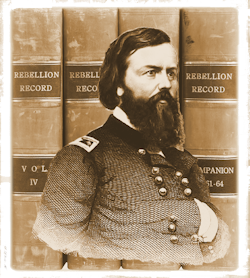Headquarters 2d Brigade S. C.
Beaufort, S. C. March 2d, 1862.
My dear Mother:
In the short letter I wrote you last week, I mentioned that I would not encourage your visiting Beaufort, and will now state my reasons more at length. In the first place, we have here some four thousand men on the island, of whom the best are long separated from the refining influence of home, and, in consequence, the two or three ladies who are visiting here are subject to a deal of coarse remark, to which I would not be willing that any woman should be subjected, where it lay in my power to prevent. Again, it would be quite impossible to provide you with such accommodations as would enable you to spend a few days without more suffering than you could well bear. It is all well for Quartermasters, who are not liable to be removed from this Post at a moment’s notice, to provide themselves with bedding and comforts from the North, suitable for lady friends, but this cannot be the case with those of us who are liable to an order to move at any moment, and to whom only a certain number of lbs. of baggage is allowed. We are not, moreover, so absolutely secure from the probability of an attack, that it is with perfect safety a lady may venture here. Should an attack take place, there would be a double duty to perform, the one to place my mother in security, and at the same time to assist in providing for the safety of the Brigade. I fear it would be hard to combine the two. However, I will say this, a hotel is soon to be opened here. If it has the effect to draw many lady visitors to Beaufort, I would not then say nay to your coming, but I imagine it will become more the resort of topers than of fine ladies. Well, dear mother, let us trust that there will soon be some way opened to us by which we may meet happily.
I tell you what I think would be a capital idea though — that is for Hunt or Walter, or both, to make me a flying visit one of these days. I think that would really be capital.
I was round to dine with Alfred Rockwell to-day. He is certainly a real good fellow, and if I have not given him the credit for rapidity of action, he certainly is doing what he attempts exceedingly well. His whole soul is absorbed in his battery, and he makes a better officer every day. I wrote Horace a few days ago, and trust he may receive my letter. We are getting, in indirect ways, glorious news from the North concerning the capture of Fort Donelson, and are now impatiently awaiting the arrival of a steamer with particulars. We can hardly credit a report now current, regarding a convention to be called by the Governor of Tennessee to repeal the Secession Ordinance in that State. Our latest dates are Feb. 16th, and here it is the 2d of March.
There was quite a funny affair happened last night among the pickets. Fresh meat has long been scarce in the Command, and we are forced to await the arrival of a steamer from the North before we can indulge in such a luxury. This morning, among the “Reports” sent in to these Headquarters from the “Advanced Posts,” was one containing the following remarkable account: That about 1 o’clock last night, the pickets guarding a causeway were startled by the steady tramp of advancing footsteps. On looking in the direction whence the sound came, they saw — Oh wonderful! a cow marching steadily toward them, a secessionist grasping her by the tail, and five men following in single file, protected from harm by the flanks of this redoubtable cow. Our pickets, instead of running, fired upon the foe. The cow fell groaning to the earth, and the secessionists fled and were seen no more. I hardly need add, that those pickets had fresh meat for breakfast, and though the laws against killing cattle are very stringent, in such a case nothing could be said. Capt. Elliott has not yet arrived, so I am not yet in receipt of the wine Uncle Phelps has been kind enough to send me. Still I thank him very much for his kind remembrance.
It is getting late, so many kisses, mother, and good night.
I am very affec’y.,
W. T. Lusk











